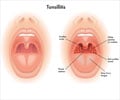Frequently Asked Questions
1. Why might a healthcare professional recommend a tonsillectomy?A tonsillectomy is typically recommended when individuals experience recurrent or severe throat infections, breathing difficulties due to enlarged tonsils, or other conditions that significantly impact their health. Your healthcare provider will assess your specific medical situation to determine if the procedure is necessary.
2. What are the potential risks associated with tonsillectomy?
Like any surgical procedure, tonsillectomy carries potential risks, including bleeding during or after surgery, infection, and anesthesia-related adverse effects.
3. How long does the recovery period typically last after a tonsillectomy?
The recovery period can vary from person to person, but individuals generally experience a few days of discomfort, trouble swallowing, and may need to follow a soft or liquid diet during this time. Adequate sleep and adherence to postoperative care recommendations are essential for a successful recovery.
4. Is there an age limit for tonsillectomy, and does age affect the safety of the procedure?
Tonsillectomy is frequently performed on younger patients, particularly children, whose decisions may be influenced by the frequency and severity of infections, sleep issues, and overall impact on general health. The safety of the procedure is assessed based on the individual's age, general health, and any underlying medical conditions.
5. Are there alternatives to tonsillectomy for treating conditions like throat infections or sleep apnea?
Depending on the specific condition, non-surgical alternatives may be explored before opting for tonsillectomy. These alternatives could include antibiotics for infections or continuous positive airway pressure (CPAP) therapy for sleep apnea.







